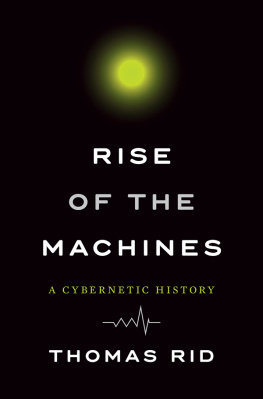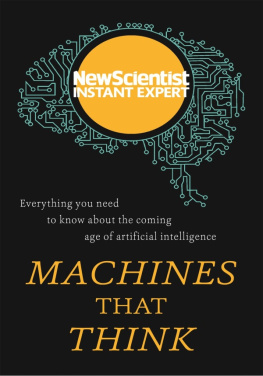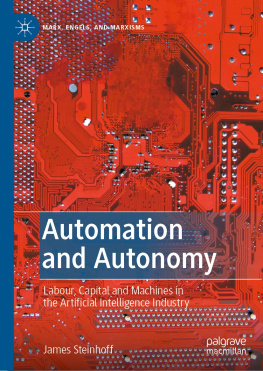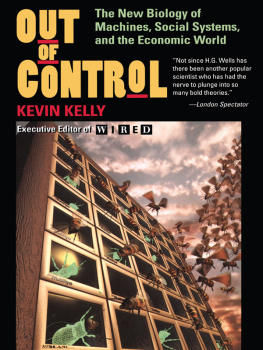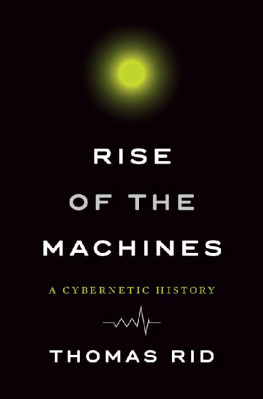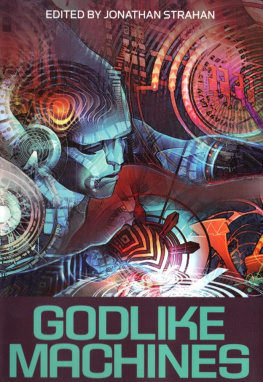Rid - Rise of the machines: a cybernetic history
Here you can read online Rid - Rise of the machines: a cybernetic history full text of the book (entire story) in english for free. Download pdf and epub, get meaning, cover and reviews about this ebook. City: New York, year: 2016, publisher: W. W. Norton & Company, genre: Romance novel. Description of the work, (preface) as well as reviews are available. Best literature library LitArk.com created for fans of good reading and offers a wide selection of genres:
Romance novel
Science fiction
Adventure
Detective
Science
History
Home and family
Prose
Art
Politics
Computer
Non-fiction
Religion
Business
Children
Humor
Choose a favorite category and find really read worthwhile books. Enjoy immersion in the world of imagination, feel the emotions of the characters or learn something new for yourself, make an fascinating discovery.
- Book:Rise of the machines: a cybernetic history
- Author:
- Publisher:W. W. Norton & Company
- Genre:
- Year:2016
- City:New York
- Rating:3 / 5
- Favourites:Add to favourites
- Your mark:
- 60
- 1
- 2
- 3
- 4
- 5
Rise of the machines: a cybernetic history: summary, description and annotation
We offer to read an annotation, description, summary or preface (depends on what the author of the book "Rise of the machines: a cybernetic history" wrote himself). If you haven't found the necessary information about the book — write in the comments, we will try to find it.
Rid: author's other books
Who wrote Rise of the machines: a cybernetic history? Find out the surname, the name of the author of the book and a list of all author's works by series.
Rise of the machines: a cybernetic history — read online for free the complete book (whole text) full work
Below is the text of the book, divided by pages. System saving the place of the last page read, allows you to conveniently read the book "Rise of the machines: a cybernetic history" online for free, without having to search again every time where you left off. Put a bookmark, and you can go to the page where you finished reading at any time.
Font size:
Interval:
Bookmark:


Copyright 2016 by Thomas Rid
All rights reserved
First Edition
Brautigan, Richard: From All Watched Over by Machines of Loving Grace by Richard Brautigan. Copyright 1976 by Richard Brautigan, renewed 1995 by Ianthe Brautigan Swenson. Reprinted with the permission of the Estate of Richard Brautigan; all rights reserved.
Frontispiece: Pencil sketch by Alfred Crimi.
Courtesy of Northrop Grumman Corporation
For information about permission to reproduce selections from this book,
write to Permissions, W. W. Norton & Company, Inc.,
500 Fifth Avenue, New York, NY 10110
For information about special discounts for bulk purchases, please contact
W. W. Norton Special Sales at specialsales@wwnorton.com or 800-233-4830
Book design by Lovedog Studio
Production manager: Anna Oler
ISBN 978-0-393-28600-7
ISBN 978-0-393-28601-4 (e-book)
W. W. Norton & Company, Inc.
500 Fifth Avenue, New York, N.Y. 10110
www.wwnorton.com
W. W. Norton & Company Ltd.
Castle House, 75/76 Wells Street, London W1T 3QT
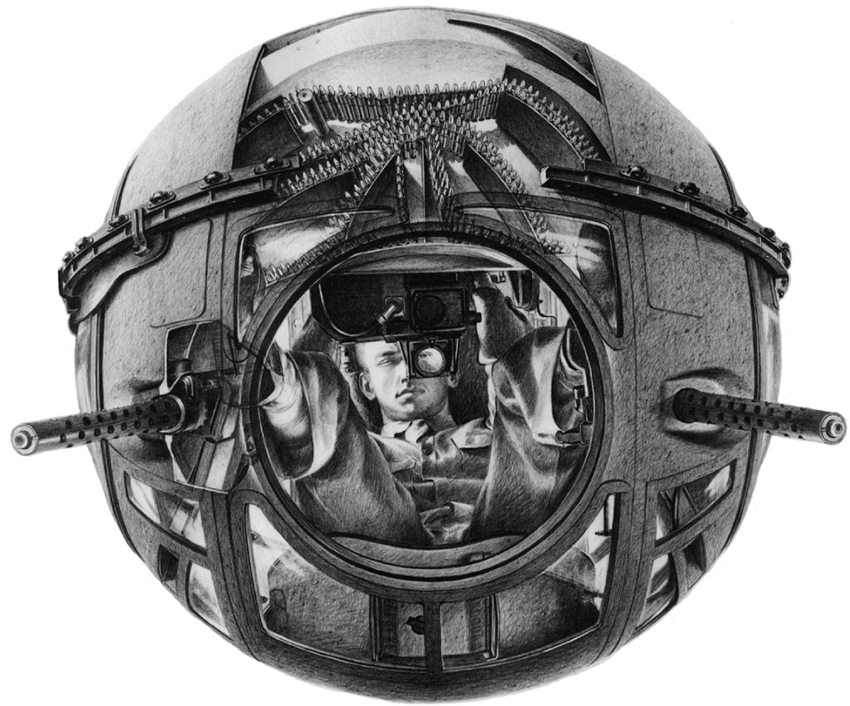
I like to think
(it has to be!)
of a cybernetic ecology
where we are free of our labors
and joined back to nature,
returned to our mammal
brothers and sisters,
and all watched over
by machines of loving grace.
Richard Brautigan, 1967
Contents
WHAT DOES CYBER EVEN MEAN? AND WHERE DOES THE idea come from?
Many people have been asking this question for some time now. My students at Kings College London did, as did cyber warfare officers in the US Air Force and Pentagon strategists. Secretive British spies inquired, as did bankers and hackers and scholars. They all struggled with the rise of computer networks, and what that rise means for our security and our liberty. And they all slapped the prefix cyber in front of something else, as in cyberspace or cyberwar, to make it sound more techy, more edgy, more timely, more compellingand sometimes more ironic.
I didnt have a good answer for them, despite having written widely on cybersecurity. This was frustrating. Like so many others, I could only point, vaguely, to a curious origin story: that of a science fiction novel written in the mid-1980s, William Gibsons Neuromancer . The indefatigable Gibson plucked cyberspace out of his airy imagination, the story goes, and then punched the future into his olive-green portable typewriter, a Hermes made in 1927. For Gibson, that new electronic space inside the machines, meaningless yet evocative, was the perfect replacement for outer space as a playground for the protagonists of his science fiction novels. He simply wanted an unblemished stage. That origin story, as improbable as it is, has been repeated countless times. Remarkably, one of the biggest challenges to our civil liberties and state sovereignty in the twenty-first century was commonly traced to a fictional story about a drug addict escaping into hallucinatory computer networks.
Could that be right? It was as if history started in 1982 with a fantasy. How did Gibsons story fit into a larger picture, into a cultural and technical trajectory that takes a longer view? How exactly had cyberspace made the leap from Gibsons solitary typewriter to the Pentagons futuristic and lavishly staffed Cyber Command? By 2010, a fast-growing share of the work of the National Security Agencyand of its British counterpart, Government Communications Headquarters (GCHQ)was somehow cyber related, as jargon had it.
Then came the great intelligence leaks of 2013. The NSAs and GCHQs publicly revealed technological capabilities outraged privacy activists and some alliesbut humbled many of the worlds most fearsome spy agencies; the leaks demonstrated a capability gap to us, one Chinese intelligence officer told me in Beijing later that year. China had to catch up. Meanwhile, major computer network breaches escalated, with foreign spies and criminals siphoning off vast amounts of intellectual property and sensitive personal information. By 2015, the global cybersecurity market of firms offering a smattering of security solutions had surpassed $75 billion, swelling at double-digit rates. So precarious were the new threats that even in times of economic hardship and austerity, government and military budget lines werent just safe from cuts, but sloping up fast.
Yet the real story of one of the worlds most exciting, most expensive, and most menacing ideas remained an enigma. So where does cyber come from? What is the history of this idea? And what does it actually mean?
I started digging. Rise of the Machines is what I found.
Cyber is a chameleon. For politicians in Washington, the word stands for power outages that could plunge entire cities into chaos at any moment. For spies in Maryland, it stands for conflict and war, and for data being stolen by Russian criminals and Chinese spies. For executives in the City of London, it stands for major security breaches, for banks bleeding money, and for ruined corporate reputations. For inventors in Tel Aviv, it triggers visions of humans merging with machines, of wired-up prostheses with sensitive fingertips, and of silicon chips implanted under tender human skin. For science fiction fans in Tokyo, it stands for an escapist yet retro punk aesthetic, for mirrored shades, leather jackets, and worn-down, dusty gadgets. For romantic internet activists in Boston, it stands for a new realm of freedom, a space beyond the control of oppressive governments and law enforcement agencies. For engineers in Munich, it stands for steely control, and for running chemical plants by computer console. Ageing hippies in San Francisco nostalgically think back to wholeness and psychedelics and turning on the brain. And for screen-addicted youth in between, cyber means simply sex-by-video-chat. The word refuses to be either noun or prefix. Its meaning is equally evasive, hazy, and uncertain. Whatever it is, it is always stirring, it is always about the future, and it always has been.
One way to clear the fog is to study the history of one of the weightiest and most pivotal ideas of the twentieth century, an idea whose legacy is set to be even more momentous as the twenty-first century moves on: cybernetics . Cybernetics was a general theory of machines, a curious postwar scientific discipline that sought to master the swift rise of computerized progress. From the get-go in the early 1940s, it was about computers, control, security, and the ever-evolving interaction between humans and machines.
A crucial moment, it turns out, was World War IIin particular, the air defense problem that emerged as this epic confrontation got under way. To shoot down deadly new bombers, ground-based artillery needed complex ballistic calculations, completed faster and more accurately than human computers could perform, or even read off precalculated range tables. Machines needed to be invented for the task. And soon mechanical brains started to think, in the quaint language of the time. The rise of the machines had begun.
In 1940, in the midst of all this, a curious story ran its course at the vast campus of the Massachusetts Institute of Technology. Norbert Wiener, an eccentric mathematician, read about howitzers and artillery shells and was inspired. Shooting at the blue sky, aided by creaking computers, appealed to the roly-poly professor. After the war he took a tangled set of ideas from electrical engineers and weapons designers, straightened it out, refined it, repackaged it, and, with a generous gesture, threw his creation out to an eager public like candy to a throng of hungry children.
Next pageFont size:
Interval:
Bookmark:
Similar books «Rise of the machines: a cybernetic history»
Look at similar books to Rise of the machines: a cybernetic history. We have selected literature similar in name and meaning in the hope of providing readers with more options to find new, interesting, not yet read works.
Discussion, reviews of the book Rise of the machines: a cybernetic history and just readers' own opinions. Leave your comments, write what you think about the work, its meaning or the main characters. Specify what exactly you liked and what you didn't like, and why you think so.

